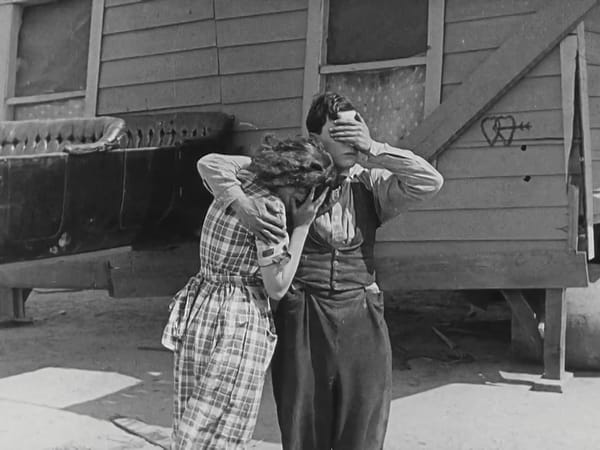On Film Criticism #2: Sensations

Senses run through this second issue of Animus. Mark Asch writes beautifully about the doubt that so troubles Tom Cruise’s character in Stanley Kubrick’s Eyes Wide Shut, an anxiety which only the certitude of bodily sensations can quell. James King meanwhile explores The Scent of Green Papaya, a film that chooses to “eschew plot mechanics in favour of what is essentially a succession of sensory interactions.” The long take from Nanni Moretti’s Dear Diary described and analysed by Caspar Salmon is similarly plotless, a wordless trip towards the town of Ostia in the footsteps of Pier Paolo Pasolini that subtly decries a certain loss of authenticity throughout Italy. Juliette Binoche also tries to get a genuine sense of working class life in Between Two Worlds, which played this year at the Cannes Film Festival. And in Emmanuel Finkiel’s Memoir of War, words and sensations are practically enemies.
As the summer calls on us to (safely) get out and once again feel the sunshine on our faces, our bodies hunger for experience, and cinema’s works of sound and vision may find themselves at the bottom of our list of priorities. But the medium constantly exists at the juncture between our ability to feel and our tendency to rationalise — and valuable film criticism is alive to both.
Last month’s editorial focused on the importance of ideas in cinema and in film writing, but complete abstraction from physical reality is neither desirable nor entirely possible. Even fans of anesthecised, sexless Marvel content love to ship characters, imagine their sex lives and sexual orientations, and create fans edits of their most seductive hair flips, smiles or hip movements. That these latter videos often feature more footage of the actors on set than clips from the films and shows themselves is no doubt partly due to copyright issues, but on-set footage also captures much more of these actors’ charm and presence.
Plot in Hollywood is seen as “objective”, obeying a logic that everyone can understand and agree on, and is therefore perceived by the big studios that invest millions into the blockbusters that dominate worldwide box office as a much less risky avenue of creation than the more uncertain domain of sensations. The failure of Wild Mountain Thyme recently added one more nail in the coffin of a cinema of unexplained but sweeping feelings that is only rarely made at this scale today. But a hunger for sensations remains, and as plot eats away at more and more of the less defined, more abstract space previously reserved to the body in much commercial cinema (see online debates about “useless” sex scenes, depressingly co-opted by the now Palme D’Or winner Titane director Julia Ducournau at this year’s Festival de Cannes), this longing re-emerges elsewhere, in viewers’ own attachments to the films they watch or to the “content” they “consume.”
In its most benign form, it comes out as an almost systematic re-appropriation of small details from films, taken out of context to appear more original, interesting and wild than they really are. This desperate search for something endearingly human in a mass of panel-approved decisions will pick out an incongruous word in the mouth of a movie star or a moment that would seem surreal without knowledge of the film’s plot. A sense of surprise or dissonance is naturally sought out to rescue us from the drudgery of plot and “storytelling.”
This de-contextualisation can be a source of great creativity and a way to find joy in very uninspiring work. However it becomes a problem when it is mistaken for actual film criticism. Anyone can watch an awful film and point out how it includes moments or lines of dialogue that are ridiculous, amusing or moving in themselves, but a film isn’t a slideshow of gifs and memes, or an end-of-year compilation video. I was recently very moved by a moment in Mia Hansen-Løve’s Bergman Island in which the wonderful Norwegian actor Anders Danielsen Lie, with a smile on his face, simply says “Ingmar Bergman:” the glee of the character appeared to be that of the actor himself, and the idea that he would be a Bergman fan was touching. This moment was precious to me, especially as I found the rest of the film rather tough-going, but I know that it had little to do with the actual film itself and more to do with me.
This line can often be hard to define: when does someone’s opinion of a film become so coloured by their own desires and experience, that they are essentially projecting them onto the work? It is hard to argue with people’s feelings, but that is essentially the task of film criticism — to try and see as clearly as possible what is actually going on with a film, all the while letting it carry us away.
At a time when it is in the best interest of many outlets and writers to oversell the quality of a work and to manufacture sensations where there are none, and as films themselves now create these offbeat moments themselves (see Space Jam 2, cynically engineered to be a incongruous, startling mishmash of IP), we all would do well to ask for a more sensual cinema that is actually alive to the senses. A large part of this work would involve moving away from the fragmentary approach that isolates moments and scenes to be dissected on their own, in order to return to film as a continuous experience. But most of all, we would need to learn to take our own sensations seriously.




